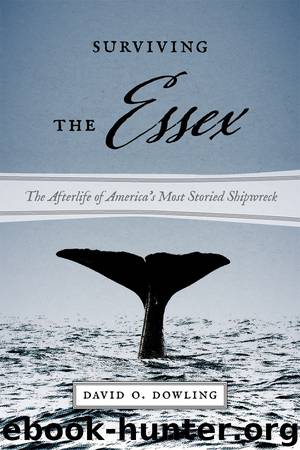Surviving the Essex by Dowling David O.;

Author:Dowling, David O.;
Language: eng
Format: epub
Publisher: University Press of New England
Chapter 5
NIGHT WATCHMAN
Somewhat like Oedipus after his fall, Captain George Pollard Jr. would transform himself, after the Two Brothers wreck, from a powerful leader into a humble figure bearing insights on the island of Nantucket. Of course he never intended to play the role of sage. Instead, it seems to have chosen him.
Pollard’s decision to settle on Nantucket, where he was raised, rather than in a major urban center like New York City or Philadelphia relatively unconcerned with whaling, is worthy of mention. In the small community, he must have known he would be highly visible and thus the inevitable object of scorn and gossip. On the one hand, Melville’s observation that “to the islanders, he was a nobody” accurately captures Pollard’s withdrawal from the limelight as a ship captain, a vocation celebrated for strengthening the island’s economy and embodying the virtues of bravery and fortitude.1 On the other, Pollard was far from a “nobody.” He would remain well known on the island, owing to his deep Nantucket Quaker lineage, his wife Mary’s highly visible anticipation of his return from sea, and the community’s profound awareness of both his failed voyages.
Upon his somber homecoming in February of 1823, having just wrecked the very ship that had brought him safely to shore after the Essex ordeal, Pollard was not afforded a hero’s welcome, or a loser’s chill reception, so much as folded back into the tribe. For his part, instead of wallowing in self-pity or claiming extra time to rehabilitate, Pollard set about to fill the island’s immediate need for security by taking a job as a night watchman. The former captain could thus serve society’s needs while also acting with integrity in a place where residents, for centuries, had shown little tolerance for self-righteousness following a public failing. As the last chapter made clear, Pollard knew that shipowners deemed him unfit for whaling. But the former captain, despite opting for a quiet life, would hardly become obsolete. In fact he would capture the imagination of two of the best minds of his generation, Herman Melville and Ralph Waldo Emerson. We must then inquire more deeply into why both men made special journeys to meet this twice-stricken and self-proclaimed “unlucky man.”
This chapter is concerned with how Pollard could survive and subsist, both spiritually and materially, after his twin seafaring losses. Indeed, to both Melville and Emerson, Pollard stood for much more than New England grit, but instead something larger betokening the human cost of the nation’s heedless industrial development and pursuit of capital. The personal element, however, was also paramount. Pollard’s career had been ruined, at least in part because of these greater forces, yet the former captain showed remarkable emotional and psychological fortitude, given a crucible that would have driven others to madness. Perhaps this achievement emerged from his having a temperament and philosophy akin to that of Emerson, who, faced with the crushing losses of his own wife and son, could “in the solitude to which every man is
Download
This site does not store any files on its server. We only index and link to content provided by other sites. Please contact the content providers to delete copyright contents if any and email us, we'll remove relevant links or contents immediately.
| Automotive | Engineering |
| Transportation |
Small Unmanned Fixed-wing Aircraft Design by Andrew J. Keane Andras Sobester James P. Scanlan & András Sóbester & James P. Scanlan(32569)
Navigation and Map Reading by K Andrew(4884)
Endurance: Shackleton's Incredible Voyage by Alfred Lansing(4494)
And the Band Played On by Randy Shilts(2007)
Wild Ride by Adam Lashinsky(1863)
The Box by Marc Levinson(1854)
Top 10 Prague (EYEWITNESS TOP 10 TRAVEL GUIDES) by DK(1845)
The Race for Hitler's X-Planes: Britain's 1945 Mission to Capture Secret Luftwaffe Technology by John Christopher(1733)
The One Percenter Encyclopedia by Bill Hayes(1712)
Trans-Siberian Railway by Lonely Planet(1623)
Girls Auto Clinic Glove Box Guide by Patrice Banks(1615)
Looking for a Ship by John McPhee(1569)
Batavia's Graveyard by Mike Dash(1545)
TWA 800 by Jack Cashill(1518)
Fighting Hitler's Jets: The Extraordinary Story of the American Airmen Who Beat the Luftwaffe and Defeated Nazi Germany by Robert F. Dorr(1511)
Troubleshooting and Repair of Diesel Engines by Paul Dempsey(1495)
Good with Words by Patrick Barry(1493)
Bligh by Rob Mundle(1483)
Ticket to Ride by Tom Chesshyre(1476)
